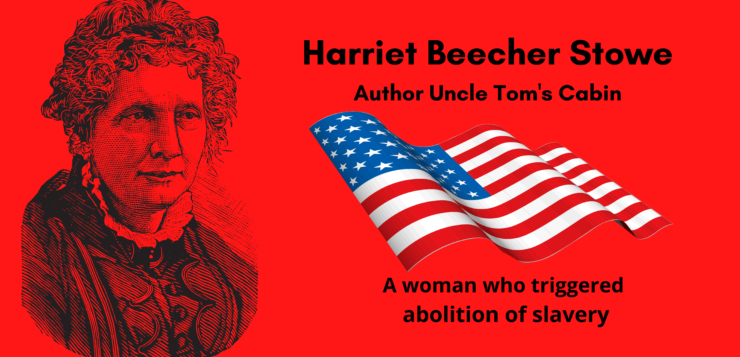“I didn’t write it. God wrote it. I merely did his dictation.”
Harriet Beecher Stowe, Author Uncle Tom’s Cabin.
Where should one place a book known as ‘Uncle Tom’s Cabin’? The assessment, that it was an extraordinary book will meet universal approval. But how extraordinary? It may seem an exaggeration to opine that it changed the destiny of slavery in the USA but it will be denying her due if she is not credited with triggering in a significant way, the epochal American Civil War leading to their emancipation. Or close to it.
Few authors in the history of humankind have been able to keep a tryst with human destiny. Das Kapital is believed to be one such book. But there have been others too. Some are privileged by providence to be widely acclaimed while others, by no means less significant, have to remain content by a mention in the footnotes.
That a strait-laced daughter of a preacher, herself married to a clergyman, could have been a trigger for the bloody and bitter American Civil War is inconceivable. But that was the fate of Harriet Beecher Stowe who was born on June 14, 1811.
‘Uncle Tom’s Cabin’ was published in 1852. It was a heart-wrenching account of the conditions faced by enslaved African Americans based on her own observations and research. It was immediately seized upon by slavery abolitionists to strengthen their cause, at the same time being furiously denounced by leading figures in the Southern states. The book certainly enhanced anti-slavery feelings considerably; so much so that historians later cited it as one of the reasons behind the American Civil War.
Early Days and Inspiration
Sixth of eleven children born to an outspoken Presbyterian preacher and a devoutly Christian mother, she experienced bereavement and dislocation early in life. By the time she was 21, the family had moved to Cincinnati, Ohio. Only the Ohio river separated her from the neighbouring slave state Kentucky. It was here that she met, talked and empathised with runaway slaves from the South, from friends and acquaintances and by frequent visits to the slave colonies. She even offered refuge and shelter to slave fugitives. It was here that the immortal ‘Uncle Tom’s Cabin’ was perceived and conceived.
Stowe claimed to have a vision of a dying slave during a communion service at Brunswick’s First Parish Church, which inspired her to write his story. Two more events fuelled her inspiration to write the book. First, her marriage to Rev. Calvin Stowe, a widower who fiercely opposed slavery and the other, the death of her own 18- month old son. She wrote: “Having experienced losing someone so close to me, I can sympathise with all the poor, powerless slaves at the unjust auctions.” The tragedy helped her understand the heartbreak that slave mothers suffered when their children were wrenched from their arms and sold.
On March 9, 1850, Stowe wrote to Gamaliel Bailey, editor of the weekly anti-slavery journal The National Era, that she planned to write a story about the problem of slavery: “I feel now that the time has come when even a woman or a child who can speak a word for freedom and humanity is bound to speak… I hope every woman who can write will not be silent.”
But it was Brunswick, Maine where the book was given a concrete shape. After newspaper serialisation, it was published in book form in 1852 under the title “Uncle Tom’s Cabin Or Life Among The Lowly.”
The Book
The book’s emotional portrayal of the effects of slavery on individuals captured the nation’s attention and fired a new awareness and awakening. Stowe showed that slavery touched all of society, beyond the people directly involved as masters, traders and slaves. In the New York Times Book Review, a critic wrote that Harriet had “baptized with holy fire myriads who before cared nothing for the bleeding slave.”
The book was not acclaimed for any literary merit or style. It was the honest and sincere rendering and the emotional richness of the narration that moved the readers. And what a cataclysmic and cathartic impact it cast on them. It, many hold, was purgatorial both for her and the reader. Some say she did not write the book, she lived it. And her book was a living chronicle of a tragedy, torture, a trial but also underlining the luminosity of hope and radiance of human endurance.
It sold 300,000 copies in its first year and in that time 300 babies in Boston alone were named after one of the book’s major characters, Eva.
But the fury and fire it created in the South were even more fierce. Steeped in their belief that slavery was necessary for the good of the economy and that slaves were inferior people who were unable to look after themselves, they felt under attack and retaliated in full might. She was depicted as out of touch, arrogant, and guilty of slander. They also responded with numerous works of what is now called anti-Tom novels, seeking to portray Southern society and slavery in more positive terms.
After the success of the book made her internationally famous, Harriet wrote to a friend: “I am a little bit of a woman – somewhat more than forty, about as thin and dry as a pinch of snuff; never very much to look at in my best of days, and looking like a used-up article now.
But she was not used up. It was not to be brief incandescence. She went on to write a score and ten books that ranged from novels, articles, collection of letters, travel memoirs, qualifying her as one of the most prolific writers and influential women of the 19th century.
Her Final Days
Her final days came two years after those of her husband. At the time she was staying in Hartford, Connecticut, and one of her neighbours was Mark Twain. He wrote of her:
“Her mind had decayed, and she was a pathetic figure. She wandered about all day long in the care of a muscular Irish woman. [In] our neighbourhood the doors always stood open in pleasant weather. Mrs Stowe entered them of her own free will, and as she was always softly slippered and generally full of animal spirits, she was able to deal in surprises, and she liked to do it.
She would slip up behind a person who was deep in dreams and musings and fetch a war whoop that would jump that person out of his clothes.
And she had other moods. Sometimes we would hear gentle music in the drawing-room and would find her there at the piano singing ancient and melancholy songs with infinitely touching effect.
She succumbed to Alzheimer’s in 1896 on July 1, just a fortnight past her 85th birthday
Views on Women
Her strong views about women’s role in the family and society have largely found articulation in her writings and portrayal of black women. “All places from where women are excluded tend towards barbarism; but the moment she is introduced, there come in with her courtesy, cleanliness, sobriety and order.” she wrote. Stowe campaigned for the expansion of married women’s rights, arguing in 1869 that: “The position of a married woman … is, in many respects, precisely similar to that of the negro slave. She can make no contract and hold no property; whatever she inherits or earns becomes at that moment the property of her husband… Though he acquired a fortune through her or thought she earned a fortune through her talents, he is the sole master of it, and she cannot draw a penny…”
She also briefly edited the magazine Hearth and Home in 1868.
A high point of Harriet’s life was a meeting with President Abraham Lincoln in Washington, just after the Civil War began. Her own accounts are vague. She wrote to her husband: “I had a real funny interview with the President.” There is no official record of what was said at the meeting but there are accounts of much joviality, and according to Harriet’s son the President greeted her with the words: “So you are the little woman who wrote the book that started this great war!”
Her Conviction and Message
Uncle Tom’s Cabin’s strong Christian message reflected Stowe’s belief that slavery and the Christian doctrine were at odds; in her eyes, slavery was clearly a sin. And she also believed that like all things evil and sinister and inhuman, even slavery will come to an end one day. “When you get into a tight place and everything goes against you, till it seems as though you could not hang on a minute longer, never give up then, for that is just the place and time that the tide will turn.”, She wrote. A telling and moving sentiment reflecting her optimism and conviction, belief in God and goodness of humans. Hers is a saga of faith and prayer, the force and power issuing forth from them, and their final and glorious triumph.
Women have often been neglected as major contributors to the history of the world either through commission or distortion. It’s a delight for us to have taken on the challenge to unearth these overlooked gems and keep relevant the stories of amazing women in history.
This article is part of a series on women through history by author Uday Kumar Varma, former secretary of the Ministry of Information & broadcasting and MSME, Government of India. An ardent proponent of gender equity, Varma writes on women through history who have excelled in their area of passion and defied conventions. You may also like to read about the activist Emmeline Pankhurst from England, the lady sniper Lyudmila Pavlichenko from Russia, the American pilot Amelia Earhart or Judge Ruth Bader Ginsberg or just maybe a piece on the Spanish artist Frida Kahlo? And you must read the story of Mata Hari– “Harlot? Oui! Mais traitoress, jamais!” ‘Courtesan! Yes; Spy, never!’





